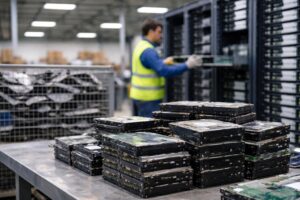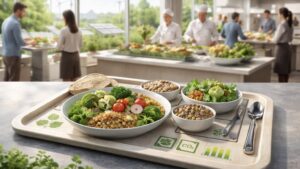The food & beverage industry has to face a monumental challenge in addressing scope 3 emissions. These embodied/indirect emissions cover the whole value chain. This is from agrarian practices and extraction of raw materials to product end-of-life management. So, this is particularly challenging for food & beverage manufacturing due to the inherent opaqueness of their supply chains, the seasonality of raw materials, and the always-binding tight requirements for food safety and quality with the intent of pursuing sustainability.
Moreover, given the increasing relevance of upstream and downstream emissions under the pressure of regulations and as a product of consumer demands towards green products, manufacturers need profound strategies to address these upstream and downstream emissions. This is without losing their operational efficiency or product quality. This article goes through three major areas for minimizing scope 3 in food & beverage manufacturing. These stand to be supply chain decarbonization, production process optimization, and value chain collaboration. So, let’s get started.
Minimizing Scope 3 in Food & Beverage Manufacturing: Supply Chain Decarbonization
The foundation of Scope 3 emission reduction in food & Beverage manufacturing lies in transforming traditional supply chains. This is into sustainable networks that prioritize environmental responsibility while maintaining product quality and safety standards. So, let us see some elements to achieve the same:
Farm-Level Emission Management
Working directly with farmers and agricultural suppliers requires a comprehensive approach to emission reduction at the source. So, this encompasses soil carbon management, fertilizer over-application, and irrigation water use optimization, among others. Furthermore, producers must set up ambient measurements of farm-scale emissions, build monitoring systems, and design incentive programs. This is to promote sustainable agriculture. Moreover, success relies on delivering technical advice, making financial resources available, and laying down a set of clear rules. This is for applying emission reduction measures without compromising yield and quality standards.
Raw Material Selection and Optimization
Raw material selection and optimization have an important impact on minimizing upstream emissions. This includes:
- Assessing the carbon footprint of various ingredients,
- Bearing in mind the possibilities of local sourcing,
- And searching for alternative ingredients that have a lower environmental impact.
Moreover, manufacturers as part of sustainable supply chain practices in the beverage industry must assess cultivation practices, processing instructions, and the transport distance involved. The selection process should also involve seasonal availability, storage, and processing efficiencies. This is to reduce waste and energy use along the entire supply chain.
Sustainable Ingredient Processing
Increasing the efficiency of food processing operations can help mitigate their associated emissions. So, this encompasses the use of energy-efficient processing technologies, optimization of water use, and minimization of waste. Furthermore, Manufacturers should aim to develop processing methods that conserve the resources available and retain product quality. Moreover, the key strategies are heat recovery systems, water recycling technology, and waste-to-energy conversion technology. These can utilize the byproducts of processing to produce precious resources.
Transportation Network Design
Transportation network optimization involves an optimal tradeoff between efficiency and environmental cost. Furthermore, this includes the task of:
- Analyzing existing distribution patterns,
- Identifying potential areas of improvement in routing,
- And investigating alternative modes of transport.
Manufacturers should consider implementing real-time tracking systems, drafting collaborative shipping agreements with other companies, and buying low-emission vehicles. Additionally, efforts should be directed toward minimizing the proportion of empty miles, maximizing load efficiency, and minimizing the distance between raw materials’ supply sources and processing clients.
Minimizing Scope 3 in Food & Beverage Manufacturing: Production Process Optimization
Optimization of production processes is desirable in terms of minimizing direct and indirect emissions in food & beverage manufacturing. This is while still maintaining product quality and safety standards. So, let us see some strategies to optimize the process:
Advanced Energy Management
Implementing comprehensive energy management systems in production facilities can significantly reduce associated emissions. So, this involves installing smart meters, creating energy use profiles of various production lines, and identifying opportunities for efficiency gains. Moreover, manufacturers should focus on efficient scheduling of equipment operation, adoption of automatic control technologies, and establishment of maintenance programs. These can ensure energy efficiency and optimal food safety levels for reducing scope 3 emissions in food production.
Cold Chain Optimization
To enhance the efficiency of the cold chain, it is crucial to consider technology and operational practices equally. Furthermore, this includes the use of innovative refrigeration systems, optimization of temperature tracking procedures as well as the creation of effective storage systems. Moreover, manufacturers should:
- Prioritize energy reduction in cold storage buildings, limiting product waste as a result of temperature fluctuations,
- And introduce predictive maintenance programs to guarantee the reliable operation of the cooling plant.
Initiatives For Sustainability in Packaging
Sustainable solutions for packaging require a holistic approach. It should consider both environmental impact and product protection requirements. Furthermore, this covers the assessment of alternative materials, optimization of packaging & designs for efficiency, and roll-out of recycling programs. Moreover, manufacturers need to find a balance between shelf-life requirements, transportation efficiency, and consumer usability. This is while working to minimize the carbon footprint of their packaging materials and processes.
Waste Reduction Programs
Successful waste reduction program implementation demands structured methods to identify and eliminate sources of waste through the process of production. Furthermore, this includes:
- Developing material tracking systems,
- Optimizing production schedules to minimize changeover waste,
- And implementing recovery programs for valuable byproducts.
Additionally, manufacturers should prioritize the design of closed-loop systems wherever they can explore opportunities to repurpose production waste and establish collaborative relationships with other sectors to adopt their byproducts.
Minimizing Scope 3 in Food & Beverage Manufacturing: Value Chain Collaboration
The value chain collaboration from suppliers to end consumers should be effectively engaged to bring Scope 3 in food & beverage manufacturing down successfully. So, let us see some methods to achieve this collaboration:
Supplier Engagement Programs
Implementing successful supplier engagement programs is fundamental to the achievement of Scope 3 emission reduction targets. Furthermore, this includes creating clear communication channels, establishing shared food manufacturing sustainability objectives, and implementing collaborative monitoring systems. Moreover, manufacturers should pay attention to offering technical aid to suppliers, implementing best practices, and designing incentive programs. These should encourage improvement in environmental performance while maintaining quality standards.
Customer Education Initiatives
The implementation of customer education programs leads to increased awareness and support for emission reduction initiatives. Furthermore, these involve:
- Establishing unambiguous communication regarding food manufacturing sustainability activities,
- Generating open and verifiable information on product carbon emissions,
- And making recommendations on sustainable manufacturing usage and waste disposal.
Moreover, manufacturers should pay attention to generating attractive content, making interactive tools for tracking envt. impact, and raising consumer consciousness on the importance of making environmentally conscious food choices.
Industry Partnership Development
Building effective industry partnerships can accelerate progress toward emission reduction goals. Moreover, this includes participating in industry working groups, sharing best practices with peers, and developing collaborative solutions to common challenges. Additionally, manufacturers should focus on:
- Creating platforms for knowledge sharing,
- Developing joint research initiatives,
- And working together to influence policy and standards development in ways that support sustainable practices.
Data Sharing Networks
Establishing working data-sharing networks is a key step for monitoring and mitigating Scope 3 emissions. Furthermore, this includes developing standardized reporting frameworks, implementing shared monitoring systems, and creating platforms for exchanging environmental performance data. Moreover, manufacturers should pay attention to data accuracy, safeguarding of confidential data, and the development of systems. These allow for efficient collaboration while preserving competitive advantages for reducing scope 3 emissions in food production.
To Sum Up
The journey to minimize scope 3 in food & beverage manufacturing needs a comprehensive method. So, it should combine innovations in technology, excellence in operations, and collaboration amongst stakeholders. The article covers the key strategies in it to achieve great results efficiently. Moreover, with the industry evolving consistently, organizations should remain adaptable to continuous improvements in the efforts toward emission reduction.
Join industry leaders at the 3rd Net Zero Food & Beverage Forum, on 15-16 January 2025, in Berlin, Germany to deep dive into strategies for Scope 3 emission reductions, innovative technologies, and practical solutions on how sustainability goals can be achieved in the food and beverage industry. This forum will help your organization build partnerships, stay ahead of competitors, and tackle all the challenges of sustainability in the industry. Register now!




